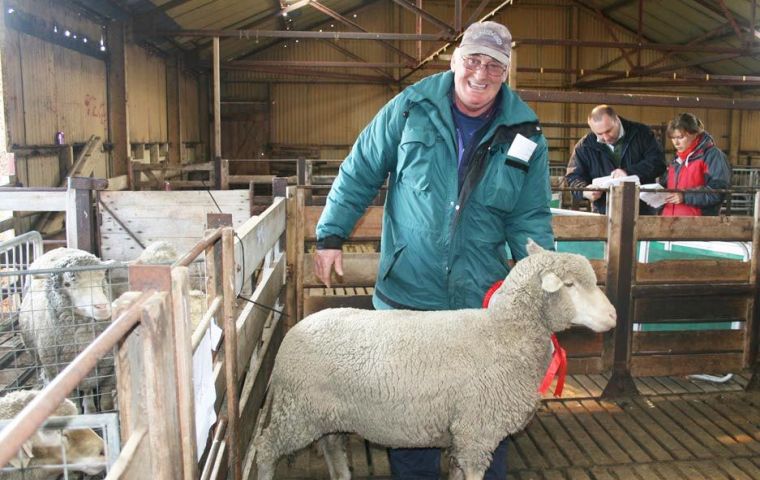MercoPress. South Atlantic News Agency
Falklands' farmers urged to prepare for declining wool prices forced by currencies' distortions
 Falklands farmers that have moved to finer type sheep over the last ten years
Falklands farmers that have moved to finer type sheep over the last ten years Falkland Islands farmers are being urged to plan for income reductions in the order of 15 to 25% for the season's wool production with the potential for more reductions, MLA Phyl Rendell announced in Legislative Assembly last week.
Senior Agricultural Advisor Neil Judd told Penguin News this week that the impact of falling wool prices was understood by many farmers. He said efforts were being made to sustain overall income through continued farm improvement (reducing micron, improving wool cuts and improving stocking rates) plus diversification of income through beef production and lamb being implemented.
Asked about the impact of falling wool prices on new and intending farmers, he said they were, “strongly supported with contingency planning in an attempt to minimize impact of income falls and also through the Farm Improvement Program.”
He acknowledged however that it was possible to, “imagine that the potential fall in price and wool income may not be fully appreciated by some farmers particularly those less involved in the direct sale of their wool and therefore are less able to make direct date and year price comparisons.”
The cause of the drop in the wool price is complex. MLA Phyl Rendell summarized it saying the prices had been, “impacted on by the global economy, the resurgent British economy and struggling Australian economy interacting to place downward pressure on the Falkland Islands wool prices.”
Asked about average wool prices in the Falklands Mr Judd said: “Falkland Islands farmers that have moved to finer type sheep over the last ten years would be averaging in the order of £4.50 - £5.50 per kilogram clean, based on individual farm profile, with the broader sheep type farms averaging in the order of £2.50 - £3.50 per kilogram clean.”
Giving background Mr. Judd explained that farmers in the Falkland Islands are paid for their wool in pence per kilogram clean (Pounds Sterling is the basis of currency).
World wool markets generally operate on what is happening in Australia and New Zealand (South Africa also important) as those countries dominate the export supply of finer type wools. Market reports are available every day of selling with the most comprehensive world market reporting in terms of prices in Australian dollar per kilogram clean (The US dollar is also a major terms of trade for wool).
He said generally between 2009 and 2013 wool markets improved slightly in Australian dollars, and the Australian economy remained quite stable in the face of the global financial crisis relative to many major economies. The Australian economy attracted interest and the Australian dollar strengthened.
The British economy was hurt badly by global financial crisis and as a result the UK pound fell markedly in value relative to many other currencies, particularly against the Australian dollar. The combination of slightly improved wool markets plus the low exchange rate of UK pound to Australian dollar meant that wool prices between 2009 and 2013 reached very high levels when expressed in terms of prices in UK pounds per kilogram clean. Mr Judd said this was “a bit of a positive double bonus for Falklands' farmers from currency exchange rates and wool prices.”
However the recent improvement in UK economy and questions about the strength of the Australian economy has meant this situation is changing; occurring slowly but consistently over last six months in particular.
The changing currency values have comprised the Australian dollar falling from approximately Aus $1.50 to UK £1.00 last year to Australian £1.90 to UK £1.00 today. The consequence is if the wool price is Australian $10.00 per kilogram clean the price in UK pounds equals £6.67 per kilogram clean (Falklands price) at Australian $1.50, and UK £5.26 at Australian $1.90. A fall of about 19% with the only change being currency. The UK pound traded at between Australian dollars 2.25 and 2.70 to the UK £1.00 for much of the time between 2000 and 2009.
He said the issue is what will happen to the relative strength of UK pound to Australian dollar, “but there is plenty of potential for further change over time”. (PN).-





Top Comments
Disclaimer & comment rules-

-

-

Read all commentsIt is a conspiracy by the sheep.
Feb 07th, 2014 - 09:08 pm 01 ElaineB
Feb 07th, 2014 - 09:37 pm 0Are they argentine sheep?
is that why there is a reduction in the money coming in?
Does their wool devaluate on their bodies even before it's cut?
Notice how if the Falkland farmers suffer a financial crisis, they weather the storm thanks to FIG help whereas if they were Argentinian farmers they would be told, sorry amigos, you go bust.
Feb 07th, 2014 - 10:27 pm 0Argentina: still wonder why the Islanders don't want to belong to your country, where your farmers have to go on strike?
Commenting for this story is now closed.
If you have a Facebook account, become a fan and comment on our Facebook Page!